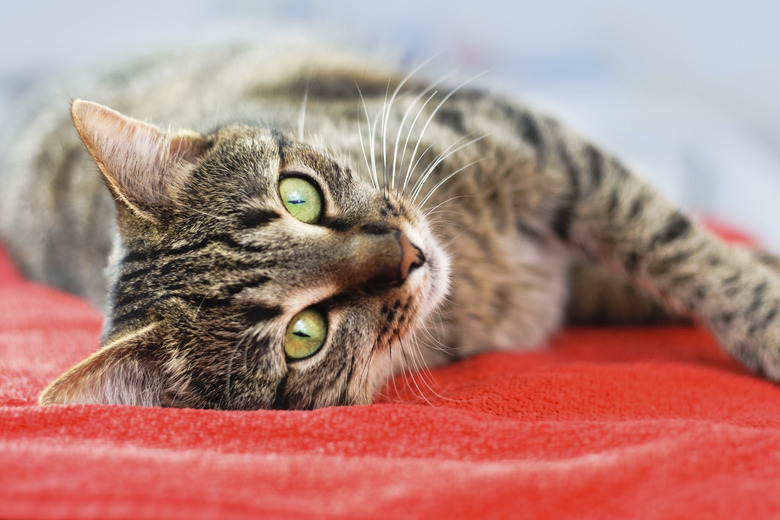What Causes Cats To Make A Clicking Noise?
Have you ever noticed your cat making a strange chirping noise while watching a bird or squirrel from the window? While this behavior may seem confusing to cat owners, felines use many sounds to communicate, and the cat clicking noise is a common vocalization in reaction to something they can't access. Likely learned in their kitten years when mother cat often uses the sound to urge her babies to follow her, cat throat clicking can be used to express frustration or gain attention.
Aside from meowing, cats have many modes of audible communication, like clicking and purring. Through vocalization, cats tell us what they need and how they feel in addition to using their body to express themselves. Note that while vocal cat throat clicking and chattering is usually nothing to worry about, a cat clicking noise coming from your pet's lungs or paired with lethargy or discomfort can be cause for concern.
Communicating with sound
Communicating with sound
From meows to purrs, screams, and yowls, cats make a lot of sounds. Vocalizations are a big way that cats communicate with us and one another. Meows are the most common noise that cats make, and depending on the length and tone, it can mean anything from a simple greeting to an announcement that their food bowl is empty.
Aside from meows and chirps, cats make many other noises to convey a point. Purring is commonly considered a sign that a cat is content, and while this is often true, at times, cats use it to bring themselves a sense of comfort when they are nervous. Hissing is a way to tell someone to step away when a cat is feeling threatened or afraid. Learning all of the different sounds cats make can help you better respond to and care for your pet's needs.
Cat clicking noise meaning
Cat clicking noise meaning
All vocalizations have meaning behind them, but one common cat sound that is still a bit mysterious to humans is chattering, or cat throat clicking. Scientists don't know the exact reasons cats make clicking sounds, but it likely has to do with excitement and annoyance. While it may seem like cats are trying to imitate birds or squirrels when they make this clicking and chirping noise, that is not the case. Cats tend to chirp and click out of frustration when they're unable to reach the animals they see outdoors.
If the clicking sound you hear your cat making sounds more like rattling from the lungs than a sound from the throat, it could be a sign of fluid in the lungs. It may be due to an infection, such as chronic bronchitis, or another serious condition. If your cat is in distress or making a concerning sound, contact your veterinarian for advice.
Cats' use of body language
Cats' use of body language
In addition to more than 60 different vocalizations, cats are also big on body language. For example, when your cat slowly closes his eyes while looking at you, it is an expression of love. Bumping others with their head, cuddling, and kneading are other ways cats show affection to both their peers and humans. A cat with a tail that is straight up or slightly curled on top is feeling social.
Ears down and a puffy tail indicate anger and the wish to be left alone. If your feline rolls onto his back to show you his belly, he is letting you know he feels safe and comfortable around you, though that does not necessarily mean he wants you to pet him there. Most cats are protective of that area and do not prefer belly rubs.
Keeping your indoor cat happy
Keeping your indoor cat happy
Looking out a window can be both a game and show in itself for your cat, but it's important to interact with her and find other ways to keep your pet active and entertained regardless of her age. Toys you can play with together can imitate the feelings your cat would get when seeing a bird or mouse. Think small, catnip-filled toys or games and wand toys that you can play with together.
Providing your cat with ways to get up high will also keep her active and content and will feed her natural instinct to climb. Consider purchasing a cat tree or cat wall shelving so your pet has new areas to explore and views to experience. The process of jumping and scaling the tree will entertain your cat while helping her strengthen her muscles.
References
- Reader's Digest: 10 Noises Your Cat Makes – And What They All Mean
- Everyday Health: 10 Cat Exercises Your Pet Will Enjoy
- Catster: Why Do Cats Chirp? All About Cat Chirping
- Catster: All About the Cat Belly — Why Cats Show It and If You Should Pet It
- The Humane Society of the United States: The Cat's Meow: Understanding Feline Language
- VCA Hospitals: Chronic Bronchitis in Cats
